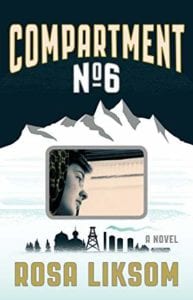
Compartment No. 6
by Rosa Liksom
translated from the Finnish
by Lola Rogers
Liksom, a painter and filmmaker, creates a cinematic travelogue of a woman traversing Russia by train.
Graywolf Pressgraywolfpress.org
Shelf Unbound: You tell the story of a young Finnish woman traveling by train from Moscow to Mongolia in the last years of the Soviet Union. I’ve read that you took this same train trip in the 1980s. What about the trip made you decide to use that as a setting for your book?
Rosa Liksom: I took this journey twice during 1980. I used this train because a train itself is a fascinating setting.
During Soviet times you just couldn’t hop off that train where you wanted. You had to plan your stops very carefully. So a foreigner traveling was like a prisoner on the train. The girl couldn’t escape. She was forced to share the cabin with that man and to listen his stories. So the train and the cabin are excellent places to investigate and follow what really begins to happen between these two people. They differ from each other in every way and still they have to share everyday life in the cabin.
In the story there are three levels. The simple story is what happens between the girl and the man, how the girl sees Siberian nature and how she experiences those cities in Siberia and the way of life. The second level describes through the girl and man what happened between Finland and the Soviet Union during the time of the Cold War. In this picture the man is the Soviet Union and the girl is Finland. The girl is trying to integrate the situation on the train. She can’t influence what happens around her. The third level is how I as an author bring in the Russian classics. That discussion is inside those stories that the man tells to the girl during their journey.
Shelf Unbound: Her compartment-mate is a misogynistic, vulgar former soldier who boorishly recounts his sexual conquests and talks about hating his wife. His personality and behavior is in stark contrast to the young woman’s. Did you create this character as a contrast to her and/or as a contrast to the changing personality of Russia and its people?
Liksom: The man is a murderer. He killed his girlfriend when he was a young man. He spent 25 year in a labour camp. His language comes from camps. He is brutal, because as a young boy he lived on the streets of Moscow. His street credibility is strong. He is not an ordinary Russian man. Before, he was part of the Russian underworld, a criminal world called Blatnoi mir, and that’s why he is so cruel and also very smart. He has read all of the Russian classics in school and in the camp, and he is a great storyteller. He is a creative person and tells these classic Russian stories in his own way.
The girl is intellectual; she knows only how the Russian intelligentsia lives but she hasn’t any idea how the Russian folk live. She lives in an ivory tower and it is very difficult for her to understand Russian common people.
So the contrast on every level between the girl and the man is huge. But life brought them to the same cabin and, little by little, they get closer to each other, because it’s the only possibility. They both are human beings. They have more things that unite them than things that divide them, just because they are human beings. We can see that education and training are just on the surface. Below that we all are the same.
Shelf Unbound: You are a fine artist as well, and n your paintings you use bright colors. The palette of this book is grey and blue (“grey half moon, grey-bearded doorman, dachas faded grey, dusty blue sky, little blue record player, blue Chinese cabinet). Did you purposefully create a specific palette for this novel?
Liksom: I was born in Lappland, the northernmost part of Finland. The landscape there is almost the same as in Siberia. For me Finnish Lapland is western Siberia. I have lived part of my life in the middle of the Arctic. I know it well.
In this story I wanted to use my visual eye. How I feel as an artist and see the Arctic nature. For me it is very dear. I love it.
Shelf Unbound: The relationship between mentally ill Mitka and his mother Irina and the young woman on the train is complex. How did you come up with the idea for these characters?
Liksom: During Soviet time it was illegal to have homosexual relationships but there was of course a homosexual world. I began to know that world when I lived in Moscow in 1981. That world had the same problems that we had in the western world. Human beings are the same all over, though the systems can be very different.
I wanted to describe that homosexual world in Soviet. Just a little bit.
Shelf Unbound: You mention a number of Russian writers and composers throughout the book. What was your purpose in doing so?
Liksom: I wanted to put those names there with whom I as a writer discuss within the story.
A woman at the Petrosavodsk State University is writing her doctoral thesis about how I use Russian classics in my writing. I met that woman and helped her to learn about how I work.
